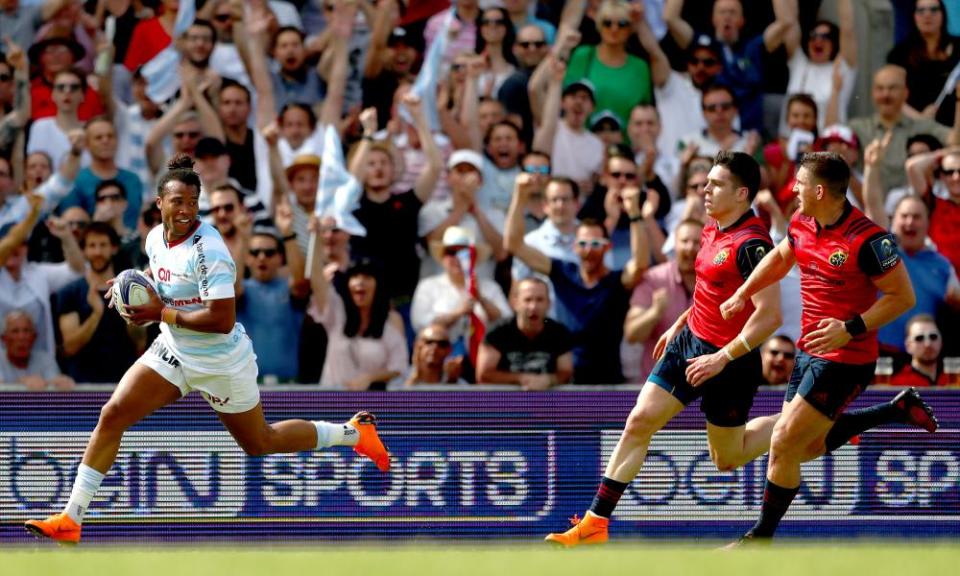Teddy Thomas runs in two tries as Racing power past Munster

The ultimate Irish rugby party may not have materialised but this season’s European Champions Cup final should still be one for the connoisseur. Forget the theory about Leinster being unbeatable this year: if Racing 92 perform for 80 minutes in Bilbao on 12 May with the same power and panache which shredded Munster early on a gorgeous afternoon in Bordeaux the trophy will be heading away from Dublin.
The first half felt almost as one-sided as Leinster’s suffocation of the Scarlets the previous day as the Parisians abruptly ended any prospect of two Irish provinces contesting the final in the immediate wake of the national team’s convincing Six Nations grand slam. Instead neutrals can now expect a Basque showdown of genuine quality, particularly if Racing can again accelerate into an early lead.
Even Munster, so often the Houdinis of European rugby, were never going to escape from 24-3 down inside 26 minutes. Roared on by the travelling Red Army, they mounted a brave second-half comeback but the damage was done. A brace of tries from the onrushing Teddy Thomas and a third from the captain, Maxime Machenaud, handed the ball by Thomas when the big wing needed only to dot the ball down to register a stunning hat-trick, had long since made the contest a Racing certainty.
Poor old Munster. This was their 13th European semi-final and nine have now ended in defeat, with their last final appearance a decade ago. As with the Scarlets, they did wonderfully well to reach the last four, only to run into high-class opponents who would have monstered most teams on the day. The Munster of old used to specialise in confounding the odds but the professional game has moved on. In this sort of company pluck and defiance take a side only so far.
It was also a thought-provoking afternoon for all those connected with England’s 2019 World Cup planning. Eddie Jones may keep insisting that club and international rugby are two different things but, if France, who will be sharing England’s pool, ever get around to selecting their best players in their optimum positions and improving their fitness levels, they are capable of causing anyone problems.
Had Munster’s forwards not dug in and a yellow card for Marc Andrieu not helped Munster to rack up three unlikely tries in the second half, it would have been a proper towelling. Thomas featured in only two of France’s Six Nations fixtures but he and the explosive Virimi Vakatawa are as lethal on their day as any strike runners in Europe. With fellow internationals such as Machenaud and Yannick Nyanga equally influential and Donnacha Ryan supplying a bit of Irish insider knowledge, modern rugby’s first rule of engagement was duly reinforced. Run hard, fast and straight enough for long enough and opponents will crack sooner rather than later.
For Munster fans of a certain vintage it was a reminder that miracles do not happen to order. Eighteen years ago in this same evocative, largely unchanged venue, Munster qualified for their first Heineken Cup final on an unforgettable, scorching hot afternoon, showing other-worldly desire to edge out a more fancied Toulouse side. It was another blissfully warm day but not, in this instance, such a memorable game for the travelling hordes in red.
They needed everything to be spot on from the start but, apart from anything else, Ian Keatley at fly-half is no Ronan O’Gara. The fly-half crucially missed a penalty kick to touch which would have given his side a promising early platform close to the Racing 22 and then, for some unaccountable reason, opted for a limp drop-goal attempt with a number of team-mates promisingly positioned outside him.
Racing, in contrast, were spot on. Only five minutes had elapsed when Thomas screamed round the outside of Munster’s narrow defensive line and over in the corner and, when Vakatawa stepped past Conor Murray to set his team-mate up for his second in the 18th minute, there was already a sense of foreboding. The sight of Thomas politely sidestepping the chance of a hat-trick to set up Machenaud instead merely underlined the chasm between the sides.
There were only 17 minutes left in the game by the time Munster finally crossed their opponents’ try-line through the replacement Simon Zebo, by which point Racing had been reduced to 14 men. The lively Zebo and another second-half replacement, Robin Copeland, injected pace and purpose previously lacking and, with Racing settling for what they had, late converted tries from Rhys Marshall and Andrew Conway added a misleading gloss to the final scoreline.
With the outcome never really in doubt, the sight of Zebo, who is heading to Racing next season, throwing his boots to the Munster fans after the final whistle merely intensified the sense of regret. Should their big rivals, Leinster, go on to lift Europe’s biggest trophy, it will take them even longer to get over it.

 Yahoo Sport
Yahoo Sport 





































